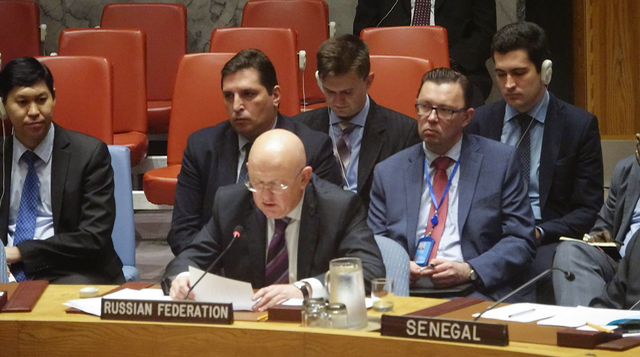Statement by Ambassador Vassily A. Nebenzia, Permanent Representative of the Russian Federation to the United Nations, during the UN Security Council meeting on Non-proliferation/Democratic People’s Republic of Korea
The Russian Federation supported the adoption of resolution 2371 (2017), on sanctions against the Democratic People’s Republic of Korea. We understand the need to halt Pyongyang’s missile and nuclear programme, which is unacceptable to us. We share the feeling of neighbouring States in the region. The ballistic missiles launched without warning from North Korea pose a major risk to marine and air transit in the region, as well as to the lives of ordinary civilians.
We call on the North Korean Government to end the banned programmes and to return to the Treaty on the Non-Proliferation of Nuclear Weapons and the oversight of the International Atomic Energy Agency. We also call on that country to join the Chemical Weapons Convention.
All must understand that progress towards the denuclearization of the Korean peninsula will be difficult so long as the Democratic People’s Republic of Korea perceives a direct threat to its own security. For that is how the North Koreans view the build-up in military activity in the region, which takes on the forms of frequent wide-ranging exercises and manoeuvres by the United States and allies as they deploy strategic bombers, naval forces and aircraft carriers to the region.
Another destabilizing factor in the region is the scaling up in the Republic Korea of the American Terminal High Altitude Area Defence missile defence system. We have repeatedly noted that this not only constitutes an irritant, but also undermines the overall military balance in the region and calls into question the security of neighbouring States.
We hope that the assurances provided by the Secretary of State of the United States were sincere, and that the United States is not seeking to dismantle the existing situation in the Democratic People’s Republic of Korea or to forcibly unite the peninsula or intervene militarily in the country.
We are concerned that the paragraph we proposed for the resolution did not receive support. Potential military misadventures on either side are liable to spell disaster for regional and global stability.
We stress that the additional restrictive measures imposed through the resolution against the Democratic People’s Republic of Korea cannot be an end in themselves. They need to be a tool to engage the country in constructive talks. It is not possible to settle the Korean issue through sanctions and pressure being brought to bear on Pyongyang alone. The resolution must be a part of a political strategy, which is yet to be crafted and agreed on, and the Democratic People’s Republic of Korea must be engaged in this.
Sanctions must not be used for the economic asphyxiation of the Democratic People’s Republic of Korea or to deliberately worsen the humanitarian situation. This applies in particular to illegal, unilateral restrictions that strike civilian sectors, which are unrelated to the missile and nuclear programmes of the country. Such sanctions may lead to the significant deterioration of the living conditions of the North Korean people — incidentally, as United Nations humanitarian agencies are warning about.
Experience shows the destructiveness of unilateral measures when sanctions, instead of diplomatic tools, are used as a universal means of settling such issues.
It is clear that in order to normalize the situation on the Korean peninsula, we need a comprehensive approach that includes an end to the missile and nuclear tests of the Democratic People’s Republic of Korea, the rejection of a reinforced military infrastructure, and the reduction of the scale of exercises and manoeuvres. There is a need to create trust among States in the region. We must abandon the obsolete, ineffective algorithms for addressing the nuclear problem in the Korean peninsula, and we must address this issue through unique creative approaches. Isolation and pressure need to be replaced by dialogue and negotiations, and that is the thrust of the Russian and Chinese dual suspension and parallel progress proposal.
We recall that our countries have drafted a joint road map that prevents the threat or use of force and proposes a comprehensive solution to all problems on the peninsula, including the nuclear one, through political and diplomatic means, without precondition, and through political talks and the resumption of SixParty Talks.
These ideas warrant attention as they represent a possible starting point to break the deadlock and resume negotiations. We must find ways to engage in dialogue with the leadership of the Democratic People’s Republic of Korea and to prompt meaningful dialogue on the nuclear and missile issues.
Once again we would like to draw attention to the joint RussoChinese statement on the settlement of the situation on the Korean peninsula, dated 4 July.
We should like to draw attention to some contentious issues in the resolution. Of course Pyongyang is violating the sanctions against it, but it is not providing the components of weapons of mass destruction to non-State actors. There is no direct link between the implementation of resolution 1540 (2004) and official Pyongyang actions. This reference in the context of sanctions must be ended. This is counterproductive for the resolution itself above all.
More than ever before, it is important to jointly seek a political solution to the range of issues plaguing the Korean peninsula. Following the adoption of the resolution today, the pressure of sanctions has been exhausted.
We stand ready to work collectively here. At the same time, the United Nations must step up efforts to deliver humanitarian assistance to the people of the Democratic People’s Republic of Korea. The relevant exemptions, provided for in the resolution at our insistence, enable us to further address this.
